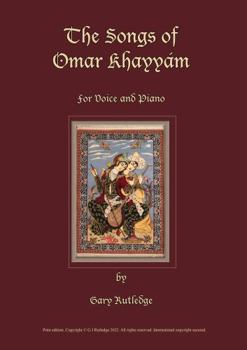The Songs of Omar Khayyám for Voice and Piano
Suitable for all voices, "The Songs of Omar Khayyám for Voice and Piano" by composer Gary Rutledge, are sourced from verses contained within the "Rubáiyát of Omar Khayyám of Naishapur" (the Edward Fitzgerald version of 1859). The songs were constructed using the Persian modes of the time; and, also as a basis for the vocal melody and the harmonic and melodic accompaniment. This volume is a Voice and Piano arrangement of the original Guitar and Voice composition. The music offers both narrative and emotion. Verses 1 and 2 refer to the dawn and with its inevitable start of a journey; but this may be a false dawn and as such, one should drink the spirit of life while we can. Verses 11 and 12 refer to how beautiful it is to be in Paradise ; but, perhaps we should take what is offered from the real world. Verses 18 and 19 refer to the observation that the hyacinth grows where death has spilled its blood; so be thoughtful of where you are, because for in this place, it may be, that someone else has died. Verses 26, 27, 28 and 29 refer to that when we die, that's it. There's nothing else. The lifelong argument about spiritual rebirth seems everlasting; but, apart from faith , we know nothing more about it than when we were born. Study what we like, life is transient. We float into life unknowing; and still not knowing, at death our ashes blow away. Verses 46 and 73 refer to our life as an endless merry-go-round of recurring behaviours; and that we long to mould our life to our desires. Verses 49 and 51 refer to life as a game of chess; where as we follow our choices, our destiny plays out; and there's nothing we can do about it. Verses 55 and 53 refer to the fact that a drunken poet may know more about life than a leaned scholar; but remember, whatever is given, can also be taken away. Verse 57 suggests that God, in giving us a predestined life, must have deliberately put in place the hidden dangers contained within it; and if that is the case, how can he impute any failure on our part to Sin? Verses 65 and 58 suggest that before we die, we should live life to its fullest; that God, in giving us a predestined life, must have deliberately put in place the hidden dangers and traps of that life; and if that is the case, there can be no imputation of our part (in the eyes of God) for our failures. What God gives with one hand He removes with the other. Visit https://www.notable.au to find other vocal music by the composer, as well as audio clips of the pieces included in this volume.
Format:Paperback
Language:English
ISBN:1922829137
ISBN13:9781922829139
Release Date:August 2024
Publisher:Notable Productons Australia
Length:52 Pages
Weight:0.43 lbs.
Dimensions:11.7" x 0.1" x 8.3"
Customer Reviews
0 rating





